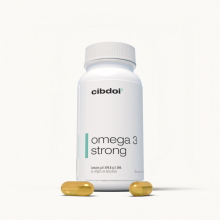Is Spinach a Good Source of Omega-3 Fatty Acids?
Published:
Omega-3 fatty acids provide many health benefits. The main dietary omega-3s are ALA, EPA and DHA. Adequate omega-3 intake promotes heart health, brain function, healthy aging and more.
Contents:
This has sparked interest in the omega-3 content of different foods. Spinach is a nutritious vegetable popular in salads and side dishes. But can spinach provide significant amounts of beneficial omega-3 fats?
Let's examine the omega-3 levels in spinach and compare to other dietary omega-3 sources.

Omega-3 Fatty Acids in Spinach
The primary omega-3s are:
- ALA (alpha-linolenic acid) mainly from plant foods.
- EPA (eicosapentaenoic acid) and DHA (docosahexaenoic acid) primarily from seafood.
Spinach contains a small amount of ALA:
- 100 grams of raw spinach has about 85 mg of ALA.
- Boiled spinach provides around 60 mg ALA per 100 grams.
This ALA content is low compared to the daily recommendations. The Adequate Intake for ALA is 1.1 grams/day for women and 1.6 grams/day for men. One cup of raw spinach has just 18 mg of ALA, or 1-2% of the daily recommendation.
Clearly, spinach is not a significant source of omega-3 fatty acids. While it contains some ALA, the amount is negligible for meeting daily omega-3 needs.
Top Dietary Sources of Omega-3 Fatty Acids
If spinach is too low in omega-3s to matter, what foods should you emphasize for adequate omega-3 intake?
Here are some of the top dietary omega-3 sources:
Plant Sources of ALA
- Flaxseeds provide the highest ALA levels, over 6,300 mg per 100 grams.
- Chia seeds also supply substantial ALA at 4,915 mg per 100 grams.
- Walnuts contain 2,574 mg of ALA per 100 grams.
- Hemp seeds provide 1,000-2,000 mg of ALA per 100 grams.
Seafood Sources of EPA/DHA
- Wild salmon contains high EPA and DHA levels, over 1,500 mg per 100 grams.
- Sardines supply about 1,500 mg omega-3s per 100 grams.
- Mackerel provides around 1,000 mg per 100 gram serving.
- Rainbow trout has 600–1,000 mg EPA/DHA per 100 grams.
Other Dietary Sources
- Flaxseed oil provides nearly 9,000 mg of plant-based ALA per tablespoon.
- Fish oil capsules provide concentrated EPA and DHA.
- Algal oil from marine algae contains vegetarian DHA.
- Pasture-raised eggs have around 110-200 mg omega-3s per egg.
In summary, the richest dietary omega-3 sources are seafood, plant oils, nuts, and seeds.
Why Are Omega-3s Important?
Here are some of the many evidence-based health benefits linked to adequate omega-3 intake:
Heart Health
Omega-3s from plant and marine sources:
- Lower triglycerides and blood pressure.
- Reduce atherosclerosis by improving artery function.
- Cut inflammation and oxidative stress.
- Decrease risk of heart attacks, strokes and death from heart disease.
Brain Health
The omega-3 DHA:
- Is a key structural component of brain and nerve tissue.
- Enhances neurotransmission and synaptic plasticity.
- Improves learning ability, cognition and memory, especially with low intake.
Eye Health
DHA is particularly vital for eyesight:
- It's highly concentrated in the retina.
- Supports visual acuity and development in infants.
- Reduces risk of age-related macular degeneration (AMD).
Mental Health
Higher omega-3 intake from seafood and plants is linked to:
- Lower risk of depression and bipolar disorder.
- Improved outcomes in major depressive disorder.
- Benefits for behavior and cognition in ADHD.
Anti-Inflammatory Effects
The anti-inflammatory properties of omega-3s alleviate symptoms of:
- Rheumatoid arthritis.
- Asthma.
- Inflammatory bowel disease (IBD).
- Type 1 diabetes.
Cancer Prevention
Observational studies link higher omega-3 intake with reduced risk of:
- Breast cancer, especially in postmenopausal women.
- Colorectal cancer.
- Prostate cancer.
In summary, omega-3 fatty acids provide wide-ranging health benefits and should be obtained through diet or supplements.
Nutritional Benefits of Spinach
While spinach doesn't provide substantial omega-3s, it supplies other key nutrients and benefits:
Vitamins and Minerals
Spinach is an excellent source of:
- Vitamin A
- Vitamin C
- Vitamin K
- Folate
- Magnesium
- Manganese
It also contains iron, calcium, potassium, vitamin E and several B vitamins.
Antioxidants
Spinach provides antioxidants like:
- Lutein and zeaxanthin to protect eye health.
- Beta-carotene, a vitamin A precursor.
- Quercetin, an anti-inflammatory flavonoid.
- Kaempferol, linked to reduced cancer risk.
Fiber
One cup of raw spinach provides almost 1 gram of fiber, mostly insoluble fiber that benefits digestion.
Health Benefits
Some top evidence-based health benefits of spinach include:
- Reduced oxidative stress and inflammation.
- Supported heart health by lowering blood pressure.
- Promoted healthy digestion and gut microbiome.
- Helped regulate blood sugar in diabetics.
- Potentially reduced risk of certain cancers.
- Protected eye health and vision.
While not a good omega-3 source, spinach remains highly nutritious and healthy.
Can You Increase Omega-3s in Spinach?
There are limited strategies to increase the tiny ALA amounts in spinach:
Choose Baby Spinach
Some research shows baby spinach may have slightly more ALA than regular spinach, though amounts still remain negligible.
Top with Omega-3 Foods
Boost omega-3s in spinach dishes by adding salmon, ground flaxseeds, walnuts, edamame or avocado.
Eat More Frequent Servings
You'd have to eat very large and frequent spinach servings to meaningfully raise omega-3 intake.
Key Takeaways on Spinach and Omega-3 Fatty Acids
In summary:
- Spinach provides only small traces of ALA omega-3, about 1-2% of the daily recommended amount per serving.
- The richest dietary omega-3 sources are fatty fish, plant oils like flaxseed oil, walnuts, chia and hemp seeds.
- Spinach remains highly nutritious despite negligible omega-3 content, providing vitamins, minerals, antioxidants and fiber.
- Strategies like choosing baby spinach and adding omega-3 toppings provide only minimal increases.
- Large daily spinach servings would be needed to noticeably increase omega-3 intake.
Conclusion
Spinach does not offer significant amounts of omega-3 fatty acids. To meet your daily needs, include fatty fish, flaxseeds, walnuts and oils in your diet, or take fish oil supplements.
Enjoy spinach for its many other nutritional benefits, but not as a major source of anti-inflammatory omega-3 fats. Focus on other omega-3-rich foods to ensure adequate intake of these essential fatty acids.















